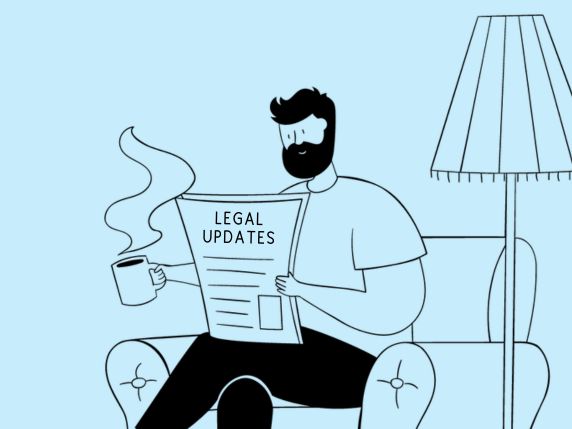In this month's update, we'll cover:
Corporate:
Companies House reforms to combat fraud in transactions
Following the government’s 2019 consultation on Corporate Transparency and Register Reform, on 18 September 2020, measures were announced with the aim of increasing reliability of company data to reduce fraud and money laundering.
It is critical to ensure that data on Companies House is reliable as it helps to inform businesses, including lenders, and it is estimated the data is worth up to £3 billion per year to users. These reforms will give Companies House more power to question and reject information and should give users greater protections over their personal data.
Under the new measures, directors will not be able to be appointed until their identity has been verified by Companies House. This will mean that particularly smaller companies can have more faith in the individual behind the companies that they do business with, and law enforcement agencies will be able to track activity of particular individuals and their transactions more easily.
The Minister for Corporate Responsibility has advised that: ‘Where any new controls are introduced, Companies House will keep the burden on business as low as possible and will continue to look for ways to make incorporation and access to its services as smooth as they can be’. The Minister is also looking at future consultation to streamline and digitise other processes such as improving efficiency in filing company accounts.
HMRC publishes research on tax advantaged share schemes
In January last year HMRC commissioned the Social Research Institute at Ipsos Mori to carry out research into tax advantaged share schemes (TASS) and the results were published this month.
The aim of the research was to understand the motivations for, and barriers to, employers and employees participating in tax advantaged share schemes, while looking at customer awareness and knowledge of the schemes on offer.
The report primarily looked at:
- The drivers and barriers of TASS for employers and employees
- How schemes are communicated
- How to encourage increased uptake of TASS
- And how schemes are administered
Ipsos Mori found that societal and economic changes over the last decade have made tax advantaged share schemes less attractive when compared with other employee incentive initiatives for motivating or retaining staff. Smaller companies often consider TASS unaffordable and SAYE is viewed as inflexible.
In respect of employee perceptions, generally TASS is more attractive to older employees and those in senior job roles who have more money to invest and better understand the tax advantages. SIPs, Company Share Option Plans and EMI schemes are viewed as more attractive and flexible schemes, but the holding periods of these schemes can deter some employees.
Ipsos Mori found that awareness and detailed understanding of TASS is generally low, as many employers outsource the management of schemes, but that even where businesses do manage the schemes themselves, they still lack a detailed understanding of the schemes. If you would like to better understand your share scheme, please contact our specialist employee incentive solicitors.
Commercial:
Government ‘bounce back’ plans for consumers and retail
Earlier this month the Minister for Exports outlined a ‘bounce-back’ from the impact of Covid-19 with a plan of trade measures for the consumer and retail industry when exporting overseas.
These measures include:
- Specialist advice on online retail and international marketplaces
- A Consumer and Retail Export Academy is to be set up to give businesses a digital learning course aiming to increase exports by giving businesses relevant knowledge, skills, and networks
- Long-term support for the sector with new export opportunities, such as new trade deals negotiated by the UK
E-commerce is the focus of the ‘bounce back’ plans and the aim is for consumer and retail businesses to maximise their online sales.
CMA updates guide to competition risk for managers
Earlier this month the CMA updated their short guide to competition law risk published in November 2014. The purpose of the guide is to provide a basic overview of competition law and help risk professionals to decide business behaviours that could put firms at risk of breaching competition law and explains the penalties for doing so.
The guide states that individuals are far less likely to break competition law, if they are aware, they could be held directly liable and penalised by way of:
- A fine of to 10% of annual worldwide turnover
- Third party damages
- Director disqualification
- Reputational damage
- And, if involved in cartel activity, prosecution under the Enterprise Act 2002 carrying a maximum sentence of up to five years in prison and a fine
The most recent update specifically focuses on potential risk for company directors, where serious anti-competitive activity, such as such as price-fixing, bid-rigging or market sharing could lead to director disqualification.
As the CMA has now improved its efficiency it will now consider disqualification of a director in all cases of competition law infringement and the CMA can pursue director disqualification for up to 15 years by legally binding commitment from the director, or by court order. Directors who cooperate with a CMA investigation may be able to avoid disqualification and prosecution.
The guide sets out three points of concern which businesses should be vigilant of:
- Cartel behaviour and agreements
- Other anti-competitive agreements such as joint selling or purchasing with competitors or long exclusivity periods
- Abuse of dominant position generally considered to be where your business has a persistent market share above 40% and is able to set barriers to entry to the market
Businesses should identify the risks, analyse, and evaluate the risks, manage the risks, and monitor and review all these steps.
The guide notes it was able to provide certain competition exemptions during the Covid-19 crisis if cooperation is necessary to meet the needs of consumers, but this will not excuse businesses from using the crisis as a ‘cover’ for non-essential collusion.
New government grants available for businesses affected by local lockdowns
On 9 September 2020, a local lockdown business support scheme was announced. This means that grants worth up to a maximum of £1,500 every three weeks will be offered to businesses in England required to close due to local lockdowns or targeted local COVID-19 restrictions. Businesses still closed nationally will not be eligible and any grant will count as taxable income.
If a business’ premises has a rateable value of less than £51,000 or the annual rent or mortgage payment for the business is less than £51,000, that business will receive £1,000. If the rateable value, annual rent, or mortgage payment is £51,000 or more, the business will receive £1,500.
Local authorities will also receive an additional 5% of business support funding so that they can help other businesses affected by closures, at their discretion.
Commercial Property:
Protection from forfeiture extended in England and Wales
Section 82 of the Business Tenancies (Protection from Forfeiture: Relevant Period) (Coronavirus) (England) (No 2) Regulations 2020 which prevent landlords from using a right of re-entry to bring a business tenancy to an end on the basis of non-payment of rent during the "relevant period" has followed the Business Tenancies (Extension of Protection from Forfeiture etc.) (Wales (Coronavirus) (No. 2) Regulations 2020, as the “relevant period” was due to come to an end on 30 September 2020 but has now been extended until the 31 December 2020 in England and Wales.
Whilst this is good news for occupiers, this extension may upset the balance of fairness between landlord and tenant as some landlords now face increasing vacancy and non-payment by tenants, forcing them to default on their own lending covenants and secured lenders are not governed by the Regulations.
Intellectual Property:
IPO launches Intellectual Property and Artificial Intelligence consultation
The IPO aims to keep the UK at ‘the forefront of the AI and data revolution’ and so a consultation on AI and IP has been launched and remains open until 30 November 2020.
The IPO is seeking to understand implications of AI on IP policy and the impact IP might have for AI in the short to medium term, looking in turn at patents, copyright and related rights, designs, trade marks and trade secrets.
AI is defined in this context as: technologies with the ability to perform tasks that would otherwise require human intelligence, such as visual perception, speech recognition, and language translation and does not include AI superintelligence, or an AI as a legal entity.
Whilst the IPO anticipates that AI will play a part in the transformation programme in the long term, this does not fall within the scope of this consultation.
Data Protection:
Fine issued by ICO for unauthorised cold calls relating to pensions
In 2019 the Privacy and Electronic Communications Regulation (PECR), which covers marketing calls, phone, and texts, was changed to limit who could call individuals about their pensions.
Callers must now be authorised by the Financial Conduct Authority (FCA) or be a trustee or manager of an occupational or personal pension scheme and the recipient of the call must consent or have a previous relationship with the person calling them. Breach of PECR can lead to a fine of up to £500,000 from the ICO.
This was brought back into focus earlier this month. CPS Advisory Limited, a company which was not authorised by the FCA, not a trustee or manager of a pensions scheme, was fined £130,000 for making 106,987 unauthorised direct marketing calls to people about their pensions without lawful authority between 11 January 2019 and 30 April 2019.
This serves as a reminder to businesses to be aware of PECR and the level of fines that the ICO can apply if your business gets it wrong. If you require further advice about marketing and PECR, please contact our data protection solicitors.
Brexit:
Trade Bill 2019-21 update
The Trade Bill involves implementing international trade agreements which will replace existing EU trade agreements next year, after the end of the UK-EU transition period. This also involves arrangements for the UK to accede to the World Trade Organization's Government Procurement Agreement, the creation of a UK Trade Remedies Authority, and arrangements for the collection and disclosure of information relating to trade.
The Trade Bill 2019-21 was debated on 8 September 2020 in the House of Lords, when it was raised that parliament should have the opportunity to scrutinise future trade negotiations and the involvement of the devolved administrations. Protections for environmental obligations, food standards, animal welfare, and the NHS were also discussed.
The next stage for the Trade Bill 2019-21 is the House of Lords Committee stage.
UK internal market bill published
The UK Internal Market Bill was set out in parliament on 9 September and seeks to protect jobs and trade across the UK after the Transition Period ends. Devolved legislatures will have control over air quality, energy efficiency of buildings and elements of employment law, as well as their current powers.
The Bill also seeks to create certainty over trade between the individual nations within the UK and create an open, fair, and competitive market across the United Kingdom with regulations from one area to be recognised in another.
The Office for the Internal Market (OIM), will sit within the Competition and Markets Authority (CMA) and will be established as an independent, non-binding, monitoring body, to provide independent, technical advice to parliament and the devolved administrations on regulation that may damage the UK’s internal market.
The UK Government will also have increased assets previously spent centrally by the EU to provide financial assistance to Scotland, Wales, and Northern Ireland to invest in communities and businesses covering infrastructure, economic development, culture, sport, and support for educational, training and exchange opportunities both within the UK and international, which was previously mostly administered at EU level. UK funds such as the UK Shared Prosperity Fund, will also replace bureaucratic EU structural funds for increased efficiency savings and increased money to spend across the UK.
The government has said that ‘a strong UK Internal Market, with the ability of the UK Government to invest to support all parts of our Union, will help the UK Government to deliver prosperity for businesses and communities across all parts of the UK, levelling up the country and strengthening the Union’.
The Bill also states that the UK Government remains fully committed to implementing the Withdrawal Agreement and Northern Ireland Protocol and that that the government has to ensure that it has the ability to uphold commitments to Northern Ireland, preserve the peace process and protect Northern Ireland’s place in our United Kingdom.
European Commission warns UK over breaking withdrawal agreement
Mrs von der Leyen used part of her annual State of the Union address to the European Parliament to refer to the UK Government’s issuing of legislation enabling ministers to override parts of the Withdrawal Agreement relating to Northern Ireland.
Boris Johnson has justified this move as a legal ‘safety net’ to protect the peace process and protect goods moving to Northern Ireland from the rest of the UK from EU tariffs.
Justice Secretary Robert Buckland said the provisions in the UK Internal Market Bill are only intended for use if the EU reneged on its treaty obligations.
However, Mrs von der Leyen argues that ‘this agreement has been ratified by this house and the House of Commons. It cannot be unilaterally changed, disregarded, disapplied. This is a matter of law and trust and good faith’ and the EU would not backtrack on what had already been agreed.
Mrs von der Leyen also quoted Margaret Thatcher as saying: 'Britain does not break treaties. It would be bad for Britain, bad for relations with the rest of the world and bad for any future treaty on trade. This was true then and this is true today. Trust is the foundation of any strong partnership.'
Senior US congressional figures have also this month warned Boris Johnson that they would not support any US free trade deal with the UK if he tried to ‘flout’ the Northern Ireland protocol in the Withdrawal Agreement. They have also made clear that Congress would never pass a trade agreement it believed could ‘imperil’ the Good Friday Agreement.
*Please note that this update does not constitute formal legal advice and should not be relied upon as such. Always ask a solicitor if you are unsure of how the law relates to your business.






